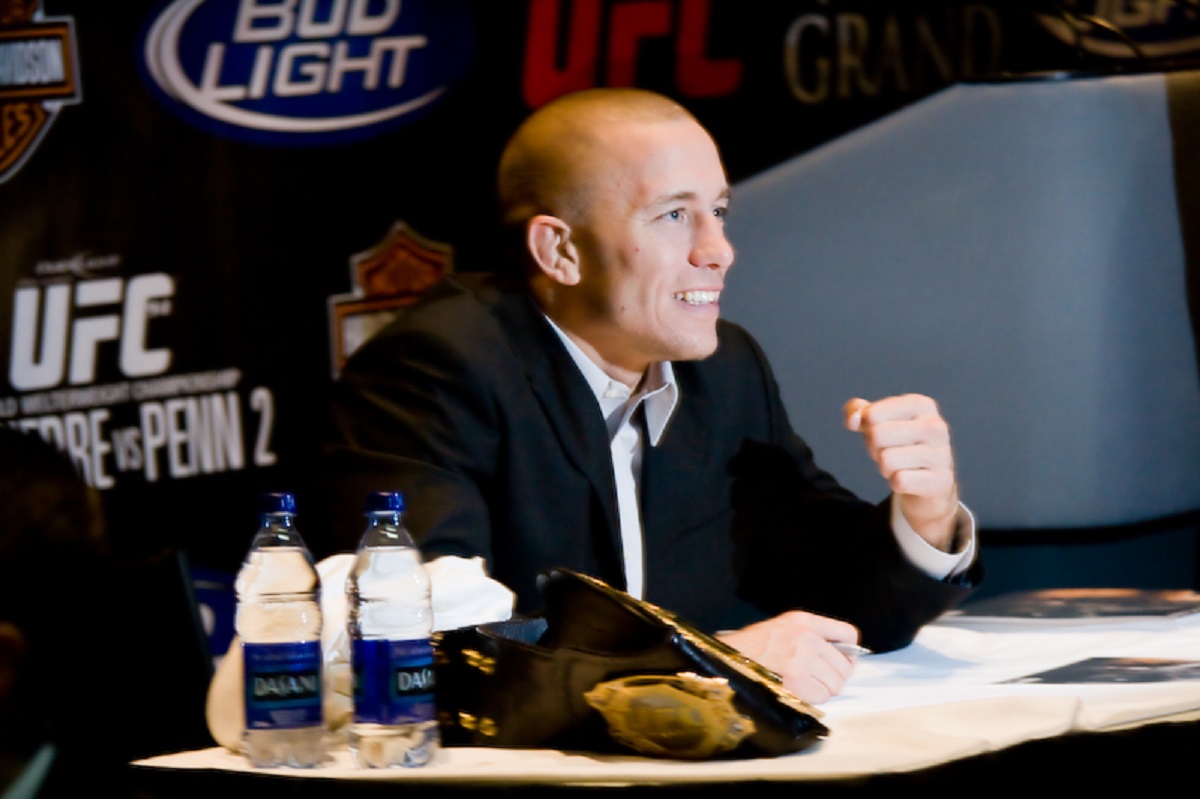Georges St-Pierre is one of the best mixed martial artists of all-time. He defended his welterweight belt for a record nine times, holding the championship belt for over 2,200 consecutive days. Later this year, St-Pierre will be inducted into the UFC Hall of Fame.
In 2017, he returned from a 4-year break from the UFC to fight Michael Bisping at UFC 217, where he became just one of four fighters to hold championship belts in two divisions.
St-Pierre’s book, “The Way of the Fight,” is the story of his rise to the top of the mixed martial arts world, told in his words and by those closest to him. The book contains countless valuable lessons for athletes, gymgoers, and everyone in-between.
Whether it’s the value of practicing with deliberate precision, managing your fears by staying present, or finding motivation and progressions in the little victories in your journey, The Way of the Fight is a great resource for those looking to find excellence in their lives, whether it’s in the octagon or not.
- “Perfect practice instead of mindless repetition.”
- “You don’t get better on the days when you feel like going. You get better on the days when you don’t want to go, but you go any way.”
- “I’ve never been the biggest guy in the ring, and I don’t ever want to be either. My goal is to be the most efficient, quickest thinking fighter. I am to be flexible, open-minded and ready for any situation.”
- “After I beat Jon Fitch, I told him it was the best thing that could’ve happened to him. I humbly submitted that the only way to see the defeat was as an opportunity to get better. That putting the defeat in the proper context would give him the same opportunities I’ve been afforded.”
- “It’s going to feel good to reach that first plateau, and what happens is that the second plateau is even easier to reach, and more gratifying. Performance improves. Results are tangible. Your mind and your body feel better and are finally working in harmony. In other words, when you prepare a list of improvements and you make them small and achievable, you won’t just stick to them, you’ll increase the chances that you’ll keep going forward.”
- “When you pay attention to detail, the big picture will take care of itself.”
- “Progress only comes in small, incremental portions. Nobody becomes great overnight. Nobody crams information if he wants to be able to use it over the long term.”
- “I believed deep inside of me that I’d be champion someday, but I also felt this wasn’t the right time… The importance of the feeling, though, is that it put me on a path. Luckily, I know that each journey begins with one step, and is followed by another.”
- “Very often, we see leaders lose sight of how they got to where they are: by being and thinking differently from the competition. They make it to first place, and then their thinking changes from seeking innovation to seeking the status quo. They think, I made it to first place, so now I must not change a thing. But change is what got them to the top in the first place! This is because they’re focused on the positive result rather than on the process of success.”
- “You can’t simply enter [the octagon] and beat someone on instinct; you can’t go in with the same approach over and over because it worked last time.”
- “My innovative capacities seem to rise up when there’s a crisis, a conflict… The way I see it, innovation is a discipline, not a lottery… It comes from the combination of two elements within my control: hard work and open-mindedness.”
- “Change is a great motivator, which is where all good training starts. When I get stuck doing the same thing over and over again, I need something new or I start developing mental fatigue. I need to feel like I’m constantly getting better.”
- “Innovation, to me, means progression, the introduction of new elements that are functional and adaptable to what I do. It’s all about making me feel better, whether through natural evolution or adaptation of previously unknown ideas. The reality is that innovation is a process, with its own rules and steps.”
- “Sometimes you don’t need to decide right then there what’s going to happen. You need to understand that the world keeps turning and nobody needs to rush into any harsh decision or situation. It’s okay to do nothing sometimes.”
- “If you find ways of staying in the present, fear can only help you.”
- “Fear freezes your actions because it takes you into the world of what-if, and that’s the worst place anybody can be. This is when you start doing stupid things like predicting the future, or thinking your career as a mixed martial arts world champion is going to end suddenly. Forecasting doom and gloom is not only useless, but detrimental. It’s giving away all your power to fear and letting it take over your life.”
- “I’ve always looked to learn from experts who know more than I do.”
St-Pierre’s book,”The Way of the Fight,” is one of my favorite mental toughness books for athletes. It is available in various formats from Amazon, including as a paperback and an audiobook, and is recommended reading for anyone who is serious about pursuing excellence.
Image Credit: Pixel of Light | Flickr | Creative Commons


